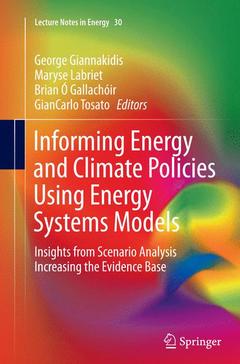Description
Informing Energy and Climate Policies Using Energy Systems Models, Softcover reprint of the original 1st ed. 2015
Insights from Scenario Analysis Increasing the Evidence Base
Lecture Notes in Energy Series, Vol. 30
Coordinators: Giannakidis George, Labriet Maryse, Ó Gallachóir Brian, Tosato GianCarlo
Language: English
Subject for Informing Energy and Climate Policies Using Energy...:
Publication date: 10-2016
Support: Print on demand
Publication date: 04-2015
426 p. · 15.5x23.5 cm · Hardback
Description
/li>Contents
/li>Biography
/li>Comment
/li>
This book highlights how energy-system models are used to underpin and support energy and climate mitigation policy decisions at national, multi-country and global levels. It brings together, for the first time in one volume, a range of methodological approaches and case studies of good modeling practice on a national and international scale from the IEA-ETSAP energy technology initiative. It provides insights for the reader into the rich and varied applications of energy-system models and the underlying methodologies and policy questions they can address. The book demonstrates how these models are used to answer complex policy questions, including those relating to energy security, climate change mitigation and the optimal allocation of energy resources. It will appeal to energy engineers and technology specialists looking for a rationale for innovation in the field of energy technologies and insights into their evolving costs and benefits. Energy economists will gain an understanding of the key future role of energy technologies and policy makers will learn how energy-system modeling teams can provide unique perspectives on national energy and environment challenges. The book is carefully structured into three parts which focus on i) policy decisions that have been underpinned by energy-system models, ii) specific aspects of supply and end-use sector modeling, including technology learning and behavior and iii) how additional insights can be gained from linking energy-system models with other models. The chapters elucidate key methodological features backed up with concrete applications. The book demonstrates the high degree of flexibility of the modeling tools used to represent extremely different energy systems, from national to global levels.
Introduction: Energy Systems Modelling for Decision-Making.- Energy policies influenced by energy systems modeling-Case studies in UK, Ireland, Portugal and G8.- A global renewable energy roadmap: Comparing energy systems models with IRENA’s REmap 2030 project.- Energy decisions in an uncertain climate and technology outlook : how stochastic and robust methodologies can assist policy-makers.
George Giannakidis holds a Mechanical Engineering Degree (1989) from the Aristotle University of Thessaloniki and a PhD in Computational Fluid Dynamics (1993) from Imperial College, University of London. Between 1997 and 2006 he was a senior consultant in the Centre for Renewable Energy Sources and Saving in Greece and since 2006 he is the Head of the Laboratory for Energy Systems Analysis. His scientific interests include energy systems analysis, energy economics and energy policy. He is in particular interested in the evaluation of the necessary energy policies for large scale penetration of renewable energies. He has participated as a project partner and coordinator in a number of EU funded projects on energy planning and renewable energy sources penetration into the energy system. He has also participated in the formulation of the Greek National Action Plans for energy efficiency, cogeneration of heat and power and renewable energy sources. Since January 2013 he is representing CRES as the Operating Agent of the Energy Technology Systems Analysis Implementing Agreement (ETSAP). He is the author of more than 25 publications related to his scientific interests.
Maryse Labriet has worked as environment/energy consultant and researcher for 20 years, with experience in research and consultancy in Canada, Europe, Africa, Central America. She now works as director of Eneris Environment Energy Consultants s.l., based in Spain. She is an engineer (France, 1991) and holds a PhD in Environmental Sciences (Canada, 2004). She has developed a comprehensive knowledge and expertise in two complementary areas: the development and application of integrated energy models to support climate and energy decision-making at national, regional and global levels; the assessment and promotion of sustainable low carbon and climate resilient energy policies, especially in the context of international cooperation. Maryse Labriet actively participated in several European Union and i
Uses methodologies and case studies to demonstrate how energy systems models are used to support energy and climate mitigation policy decision-making at the national, multi-country and global level
Provides a critical analysis of the rich and varied applications of energy systems models, their underlying methodologies and the policy questions they can address
Includes diverse global case studies, maximizing reader insights into the role of technology in energy systems models and in providing a basis of evidence for policy decision-making
Includes supplementary material: sn.pub/extras




